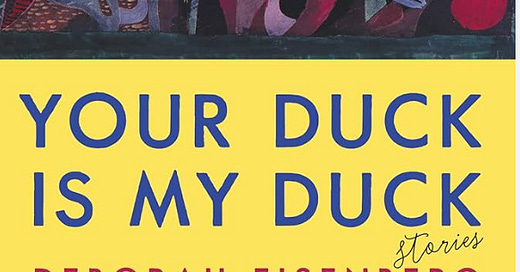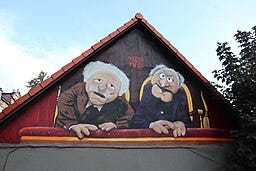One of the famous exchanges from A Moveable Feast is easy to imagine performed by Statler and Waldorf from The Muppet Show, to wit:
WALDORF: The rich—they’re not like you and me.
STATLER: No—they have more money!
BOTH: DOH, HO HO HO HO HO!!!
Fitzgerald and Hemingway (or here, Waldorf and Statler) are both right, I think. What does it mean for a person to have so much money that there is a qualitative difference between them and normals like you and me and Fitzgerald and Hemingway? One of my favorite stories, “Your Duck Is My Duck” by Deborah Eisenberg, may allow us to reflect.
The story is about a painter who is experiencing the normal mental dislocations that come with living now, and she is asked by two very wealthy people—Ray and Christa—at a party to come to their island for artist types. There, she observes the rich people with confusion, and meets a fellow artist, a puppeteer named Amos, who is working on a project called either State of Emergency or The Hand that Feeds You. The narrator takes an Ambien-like drug called Vexnix; Ray and Christa break up and get back together; ecological conditions on the island break down, largely as a result of Ray’s attempts to fix things. Finally, Amos puts on his puppet show.
The puppet show is the main event, along with the reaction of the rich people who are staying on it. The puppet show is thuddingly direct: it involves a rebellion against a king and queen who have been oppressing the people; in the second act, it’s revealed that the king and queen were just a puppet government (get it?) and the more powerful but more diffuse money interests remain actually in control. “Now that the king and queen have been toppled,” Amos explains, “a state of emergency has been declared and the laws of the land, such as they were, have been indefinitely suspended, and the corporate executives empower the army to raze the countryside and imprison the bats and the king and queen–everyone, in fact, except the strongest serfs and donkeys, who will continue to toil in the mines, but under worse conditions than before.” The narrator calls this “pretty depressing,” to which Amos says “sure, [but] these are the facts.”
What good does it do anyone to perform a puppet show like this? The most hopeful and naive puppeteer might think that he is going to achieve the status of Nathan the prophet, who presented a story about tyranny to King David and then, shockingly, told David that he was the abusive shepherd in the story. This does not seem to be Amos’s motive. Nor does he seem to want to tell off the rich creeps on the island for the personal catharsis of telling them off; Eisenberg presents his attitude as one of grim determination, rather than anarchic glee or even the milder pleasure of the South Park style “ain’t I a stinker?” position. “Never loses its sparkle, unfortunately,” Amos says when the narrator asks him what kind of themes his puppet show will explore. He has seen an injustice and wants to do something about it; and what he does is make a puppet show in opposition.
The opposition is strong, mostly in the form of Ray, a psychotically self-absorbed rich guy who destroys the island (he imports eucalyptus trees to stave off erosion, to keep beachfront for himself; and later, the eucalyptus trees burn down).. He has an affair with an actress who lives on the island named Zaffran and seems kicked out of his house; then he comes back and no one seems to acknowledge this episode (when the narrator does, Christa pats her on the head like a dog). Ray’s tour de force comes early in the story–he makes a big speech to his fellow business guys (they are accountants, and the narrator has trouble figuring out if there are three or four of them; at first she thinks that she cannot understand them because of the language they speak, but it turns out it’s English). I will quote his speech at length:
Gentlemen…I have a great deal to gain from this transaction, assuming it all proceeds as anticipated. But if at zero hour, by some mishap, it should fall through, let me remind you that, owing to the billable-hours clause you were so kind as to append to our contract, only you will be the losers. I salute your efforts. I have the highest hopes, for your sake as well as mine, that your irrepressible confidence in them is justified. But perhaps a moment of sobriety is in order at this point, a moment of reflection about the tenuous nature of careers. Or, to put it another way, don’t think for a moment that if the boat is scuttled, I’ll throw you my rope. I’m sure you all recall the Zen riddle about the great Zen master, his disciple, and the duck trapped in the bottle?...It’s not my duck, it’s not my bottle, it’s not my problem.
Obviously we are supposed to pay attention to the end: it sets up one relatively straightforward meaning of the title, something like, we’re all in this together. But I am also drawn to the first long chunk of the speech, which makes the same point but which does so by sounding like Lucky from Waiting for Godot if he had gone to the Wharton School. Ray’s assault on any kind of ethical connection is also an assault on language; he gives a brilliant garble of cliches, mean attitudes, and then an ill-deployed Zen reference. This seems to me to reflect how you might talk if you really believed that words were there to do something fun for you and that the ducks and bottles were not your problem–as if you did not have to actually say anything to anybody else.
And indeed, apart from that speech, Ray does not say much. He has an argument with Christa about how much his wonderfully named Vexnix pills affect him. His response to Amos’s play consists of him saying: “Well. So.” The other members of the audience are even less attuned to whatever facts Amos is trying to tell them: one member, a man from Jaipur, declares himself thankful, after the performance, “our generous hosts, for art, for this beautiful evening, and for the mild, sunny days ahead.” Eisenberg structures the story so that this is the last line, but readers already know, from a flash forward just before this sequence, that the island has burned down.
The story is full of this kind of irony, a thing that we might understand as the Eisenberg special: time and referents sliding around, things not quite matching up. Part of this is pharmaceutical: the narrator takes a Vexnix and loses time that way. Back in New York, the narrator had quit sleeping pills because they interfered with her art: she can’t tell if her painting suffered once she started medicating to deal with the sorry state of the world: “Maybe my painting wasn’t any worse than it had been, but I sure didn’t mind enough that it wasn’t better.” On the island, after a long time of puttering around, she comes up with a reason to paint; unlike Amos’s blunt, thesis-driven puppetry, she paints the island on fire itself. “Accident had selected me to observe,” she writes, “in whatever way I could, the demonic, vengeful, helpless, ardent fires as they consumed the trees that had replaced the crops–to observe the moment when, at the heart of the conflagration, the trees that had sustained it became phantoms, the fire’s memory.”
I think that the story needs both Amos’s blunt instrument and the painter’s helpless witnessing to make a point about what could counter the sheer face of Ray’s speech–the way his money lets him be in the world. One must know that the puppet show is correct: to be able to identify the injustices perpetrated by the structures that make up much of the world, and this is true even when it doesn’t dent the audience. One must also do what the painter does: she can witness things with paint, without a thesis but with attention. One of Eisenberg’s early sliding time maneuvers situates the story in its first sentence, where the painter writes that this all occurred “way back–oh, not all that long ago, actually, just a couple of years, but back before I’d gotten a glimpse of the gears and levers and pulleys that dredge the future up from the earth’s core to its surface.” One of those levers, I think, is Ray’s insane speech: its mix of cliche and assurance that the future will do what he says smooths things out. And he’s probably right; at the end of the story he’s doing fine, island sunk and all. But the title of the story says he’s wrong: your duck is my duck. And what Amos and the painter do, in their ways, is important too: they both make a way to understand the land we live on while the future gets dredged up.





